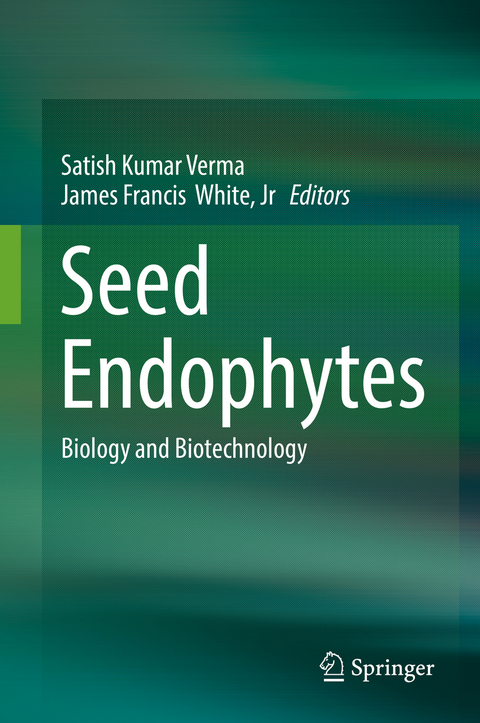
Seed Endophytes
Springer International Publishing (Verlag)
978-3-030-10503-7 (ISBN)
This book focuses on the importance and roles of seed microbiomes in sustainable agriculture by exploring the diversity of microbes vectored on and within seeds of both cultivated and non-cultivated plants. It provides essential insights into how seeds can be adapted to enhance microbiome vectoring, how damaged seed microbiomes can be assembled again and how seed microbiomes can be conserved.
Plant seeds carry not only embryos and nutrients to fuel early seedling growth, but also microbes that modulate development, soil nutrient acquisition, and defense against pathogens and other stressors. Many of these microbes (bacteria and fungi) become endophytic, entering into the tissues of plants, and typically exist within plants without inducing negative effects. Although they have been reported in all plants examined to date, the extent to which plants rely on seed vectored microbiomes to enhance seedling competitiveness and survival is largely unappreciated. How microbesfunction to increase the fitness of seedlings is also little understood.The book is a unique and important resource for researchers and students in microbial ecology and biotechnology. Further, it appeals to applied academic and industrial agriculturists interested in increasing crop health and yield.
Verma, Satish Kumar, Ph.D.
Section A: Seed Endophytes: Introduction, and Methods for Assessment and Management.- 1. Seed-vectored microbes: Their roles in improving seedling fitness and competitor plant suppression.- 2. Thinking about PPFM bacteria as a model of seed endophytes: Who are they? Where did they come from? What are they doing for the plant? What can they do for us?.- 3. Seed endophytes and their potential applications.- 4. Exploring endophytic communities of plants: Methods for assessing diversity, effects on host development, and potential biotechnological applications.- 5. Understanding the indigenous seed microbiota to design bacterial seed treatments.- Section B: Seed Endophytes: Ecology, Transmission and Adaptations.- 6. The ecology of seed microbiota.- 7. Programming plants for climate resilience through symbiogenics.- 8. Agave seed endophytes: Ecology and impacts on root architecture, nutrient acquisition and cold stress tolerance.- 9.Chemical warfare in the plant microbiome leads to a balance of antagonisms and a healthy plant.- 10. Fungal and bacterial maize kernal interactions with the vertically transmitted endophytic state of Fusarium verticillioides.- Section C: Seed Endophytes: Biology and Functional Roles in Plant development.- 11. Functional roles of seed-inhabiting endophytes of rice.- 12. Mechanism of interaction of endophytic microbes with plants.- 13. Fitness attributes of bacterial and fungal seed endophytes of tall fescue.- 14. Role of the plant root microbiome in abiotic stress tolerance.- 15. Endophytic microbes: Prospects and their application in abiotic stress management and phytoremediation.- 16. Pine seeds carry symbionts: Endophyte transmission re-examined.- Section D: Seed Endophytes: Agricultural Applications and Biotechnology.- 17. Seed endophytes of Jasione Montana: Arsenic detoxification workers in an eco-friendly factory.- 18. Agricultural applications of endophytic microflora.- 19. Rhizome endophytes: Role and application in sustainable agriculture.- 20. Agriculturally important biosynthetic features of endophytic microorganisms.- 21. Microbial Endophytes of maize seeds and their application in crop improvements.- 22. Colonization of seeds by soilborne fungi: linking seed dormancy-defense syndromes, evolutionary constraints, and fungal traits.- 23. Seed Endophytes in Crop plants:Metagenomic approaches to study the functional roles and interactions.
| Erscheinungsdatum | 19.04.2019 |
|---|---|
| Zusatzinfo | IX, 507 p. 73 illus., 64 illus. in color. |
| Verlagsort | Cham |
| Sprache | englisch |
| Maße | 155 x 235 mm |
| Gewicht | 937 g |
| Themenwelt | Naturwissenschaften ► Biologie ► Mikrobiologie / Immunologie |
| Schlagworte | bioremediation • Endophytes • microbial ecology • sustainalble agriculture • symbiosis |
| ISBN-10 | 3-030-10503-2 / 3030105032 |
| ISBN-13 | 978-3-030-10503-7 / 9783030105037 |
| Zustand | Neuware |
| Informationen gemäß Produktsicherheitsverordnung (GPSR) | |
| Haben Sie eine Frage zum Produkt? |
aus dem Bereich


